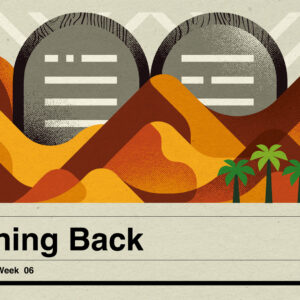February 15, 2026
Covenant Life: Living with a Holy God
“For whatever was written in former days was written for our instruction, that through endurance and through the encouragement of the Scriptures we might have hope.” –Romans 15:4
The God who rescues His people gives them His ways, makes His dwelling among them, and invites them to rest in His Covenant.
Law, Book of the Covenant → “gives them His ways”
Tabernacle → “means by which God dwells among them”
Sabbath → “anchor of their life with God”
The Law, the Tabernacle and the Sabbath all three foreshadow something very important and encouraging for us today.
Movement 1: God Forms His Redeemed People, Exodus 20–23
Redemption alone does not automatically teach us how to live free.
Exodus 20:3-17
The first FOUR commands move upward: toward God.
The remaining SIX commands move outward: toward others.
Loving God and loving others are inseparable.
“Now when all the people saw the thunder and the flashes of lightning and the sound of the trumpet and the mountain smoking, the people were afraid and trembled, and they stood far off.” –Exodus 20:18
How can a holy God dwell with a sinful people, and how can they live safely and joyfully with Him?
“But as it is, Christ has obtained a ministry that is as much more excellent than the old as the covenant he mediates is better, since it is enacted on better promises.” –Hebrews 8:6
The Law was never the destination. It was the road.
What was written on stone by the finger of God, is now written on hearts by the Holy Spirit.
Are you willing to be shaped by His ways?
Movement 2: God Dwells Among His People, Exodus 24–29
How can a holy God live with fallen, sinful people like the Israelites at all?
Exodus 24:9-11
God’s goal was never obedience at a distance. It was keeping His Covenant while in their midst.
God wants to gently guide our lives from the nearness of our hearts.
“And let them make me a sanctuary, that I may dwell in their midst.” –Exodus 25:8
The tabernacle is God saying, “I’m not leaving.”
God refuses to choose between holiness and presence.
How can a holy God live with a flawed people?
Through sacrifice.
Through mediation.
Through grace.
God didn’t bring them out of Egypt just to free them from slavery, but to live with Him.
Are you willing to trust His nearness? (John 1:14)
Movement 3: God Invites His People to Rest, Exodus 30–31
After teaching His people how to live with Him, He invites them to stop.
We’ve moved from living with guardrails, to belonging through rest.
Sabbath is not an afterthought. It is the capstone.
Exodus 31:12-14
God calls the Sabbath the sign of the covenant.
The Sabbath preached a preached a powerful sermon: God sustains life, not human effort.
“For whoever has entered God’s rest has also rested from his works as God did from his.” –Hebrews 4:10
Jesus is the fulfillment of Sabbath.
Jesus doesn’t erase the Sabbath. He fulfills it.
Have you found your rest in Jesus?
Sabbath and the Church
The Church is not commanded to keep the Sabbath.
Yet, the New Testament consistently calls us to:
• Rest in Jesus
• Live from a place of grace, not striving
• Resist legalism
• Receive life as a gift of God
Sabbath is no longer law. It is an invitation.
Are you willing to cease striving and rest in Jesus?
“Take my yoke upon you, and learn from me, for I am gentle and lowly in heart, and you will find rest for your souls.” –Matthew 11:29
Exodus 20–31
• God reveals His will
• God orders what life will look like
• God binds Himself in Covenant
• God dwells among His people
• God covers the sin of His people
• God invites them to rest
All of which points to Jesus.















